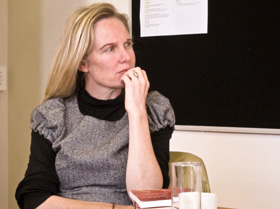Nuttall urges an embrace of the quickly shifting surfaces

Nuttall's book, Entanglement: Literary and Cultural Reflections on Post-apartheid (2009), provided the inspiration and theoretical basis for an APC reading group, which ran from March to June 2011, and was devoted to examining 'entanglement', 'hybridity' and related concepts. Nuttall's presence and input at the final session brought this series to a suitably challenging conclusion.
She said the text was written foremost for a South African audience with the aim of 'convening a public and getting people to listen'. Contrasting Homi Bhabha's use of the term 'hybridity' in Commitment in Theory (1988) with Robert Young's effort in Colonial Desire to deploy the term to critique essentialism, Nuttall argued that today's critique of difference is not obsessed with identity politics in the same way as it was during the 1980s. Rather, what is of interest in the academy today is thinking through ways that make us human.
She said her book, which has been criticised as a 'naively Johannesburg book', is 'not obedient to academic categories'. 'It's a collection of disparate essays out of which entanglement emerged as a concept during its writing,' she said.Her interest in writing it arose in the post-TRC (Truth and Reconciliation Commision) context of the early 2000s when she felt the need to 'step beyond the critiques we were forming with our eyes closed' and try to find other languages for poverty and distress through horizontal readings, as opposed to symptomatic diagnoses based on Freudian and Marxist analyses of depth and the unconscious. She described the contemporary moment as a 'world of surfaces', saying that 'we get there quicker and via different routes', and that 'there are sets of surfaces interacting to make us who we are'.
Critical of the way in which much contemporary South African literature does not articulate ways of seeing that 'make certain realities of South Africa real', Nuttall asked: 'How can texts have surfaces like [visual] art?' She said the contemporary literary scene is 'full of pieties' and an expectation of 'being deep', but that 'memory is not where it was anymore. We've collectively lost interest in the memory questions.' She argued for renewed interest in literalism as a way of 'bearing witness to other things'. Asking 'what else is there' allows for something other to surface. 'It's a question of how you read ruins,' she said. 'What symbolic language is used if the project is for reconstruction?'
Nuttall urged academic curators and producers to shift away from solely diagnosing symptoms towards framing things in ways that open up possibilities for the future. She stressed the need to engage with questions like: 'What is South Africa going to be like in 20 years' time?' - Megan Greenwood